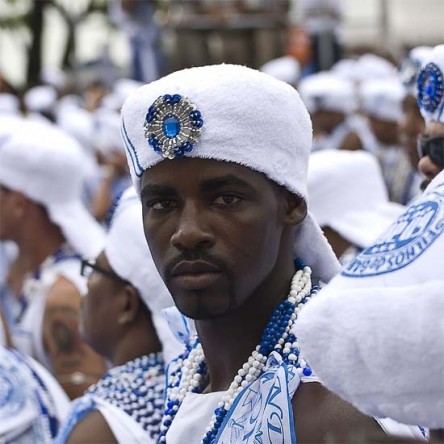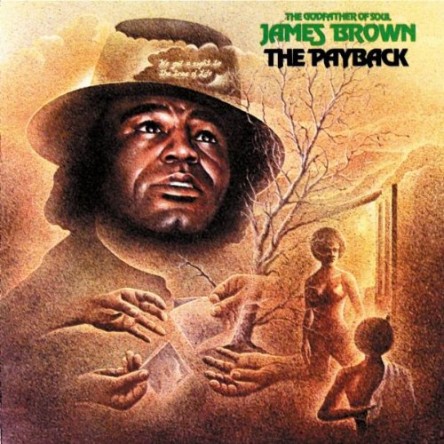SONS OF GANDHI – Brazil’s Revolutionary Non Violent Cultural Movement
Honoring Gandhi, Afro-Brazilian Heritage
via NPR.org
The first Sons of Gandhi were dockworkers on strike in Salvador who were inspired by Mohandas Gandhi’s philosophy of equality and nonviolent resistance to oppression. When they heard of his assassination, they decided to march at Carnival in his name.
They needed costumes, of course, so the prostitutes from the docks gave them their sheets to use as robes, and towels to wrap around their heads. Dressed up to look vaguely Indian, the men marched through Brazil’s first colonial capital.
The chants they still sing honor the Yoruba gods worshipped by many Afro-Brazilians. But 60 years ago, African religion was still systematically repressed by the dominant Catholic society. By garbing themselves in their namesake’s philosophy of peaceful resistance, the Sons of Gandhi were able to bring their beliefs into the streets without provoking the police.
Today, taking African rituals, music and dance out of the temples and into the streets is an old and respected part of Carnival in Salvador.
Source: www.npr.org/templates/story/story.php?storyId=100937181
Welcome Home.
This post is being composed out of a need for inspiration and self realization, and while there is what is to be considered as a proper protocol and standard in regards to how publications are to be operated, this post is a continuation of the PH tradition of breaking away from tradition only to wind up becoming reconnected with traditions that existed prior to the status quo which often show to be in perfect alignment with what comes naturally for yours truly.
Brazil’s history in short records itself as one of the first and oldest sources of African slavery beginning in the 1500’s less than one hundred years after Columbus “discovered” the New World.
Slavery in Brazil
Slavery in Brazil shaped the country’s social structure and ethnic landscape. During the colonial epoch and for over six decades after the 1822 independence, slavery was a mainstay of the Brazilian economy, especially in mining, cotton, and sugar cane production.
Brazil obtained an estimated 35% of all enslaved Africans traded in the Atlantic slave trade. More than 3 million Africans were sent to Brazil to work mainly on sugar cane plantations from the 16th to the 19th century. Starting around 1550, the Portuguese began to trade enslaved Africans due to two main reasons:
1. The unenculturated indigenous peoples deteriorated rapidly, and became increasingly wary of the Portuguese, thus, obtaining new indigenous slaves was becoming harder and harder.
2. The Portuguese Empire, at the time, controlled some stages within the African slave trade’s commercial chain, thus, providing the Brazilian landholders with the opportunity to import slaves from Portuguese trading posts in Africa. Portuguese, Brazilian, and African slave traders managed to profit even more from the increased demand.
In closing, and again, on a more personal note, this is an exploration into the reasons why human beings across waters and borders can and tend to connect with each other according to common ideas and circumstances even though their languages and cultures differ and often without any direct contact aside from the communication of the ideas, along with the reasons that explain why prostitutes and the institution of prostitution while often shown as something destructive in American culture, has repeatedly throughout history shown to be the provider of ways and means in regards to liberation causes as stated in a few notable biblical stories with this common theme.
Prostitution in Brazil
Prostitution itself (exchanging sex for money) in Brazil is legal, as there are no laws forbidding adult prostitution, but it is illegal to operate a brothel or to employ prostitutes in any other way.
A different perspective to consider.




